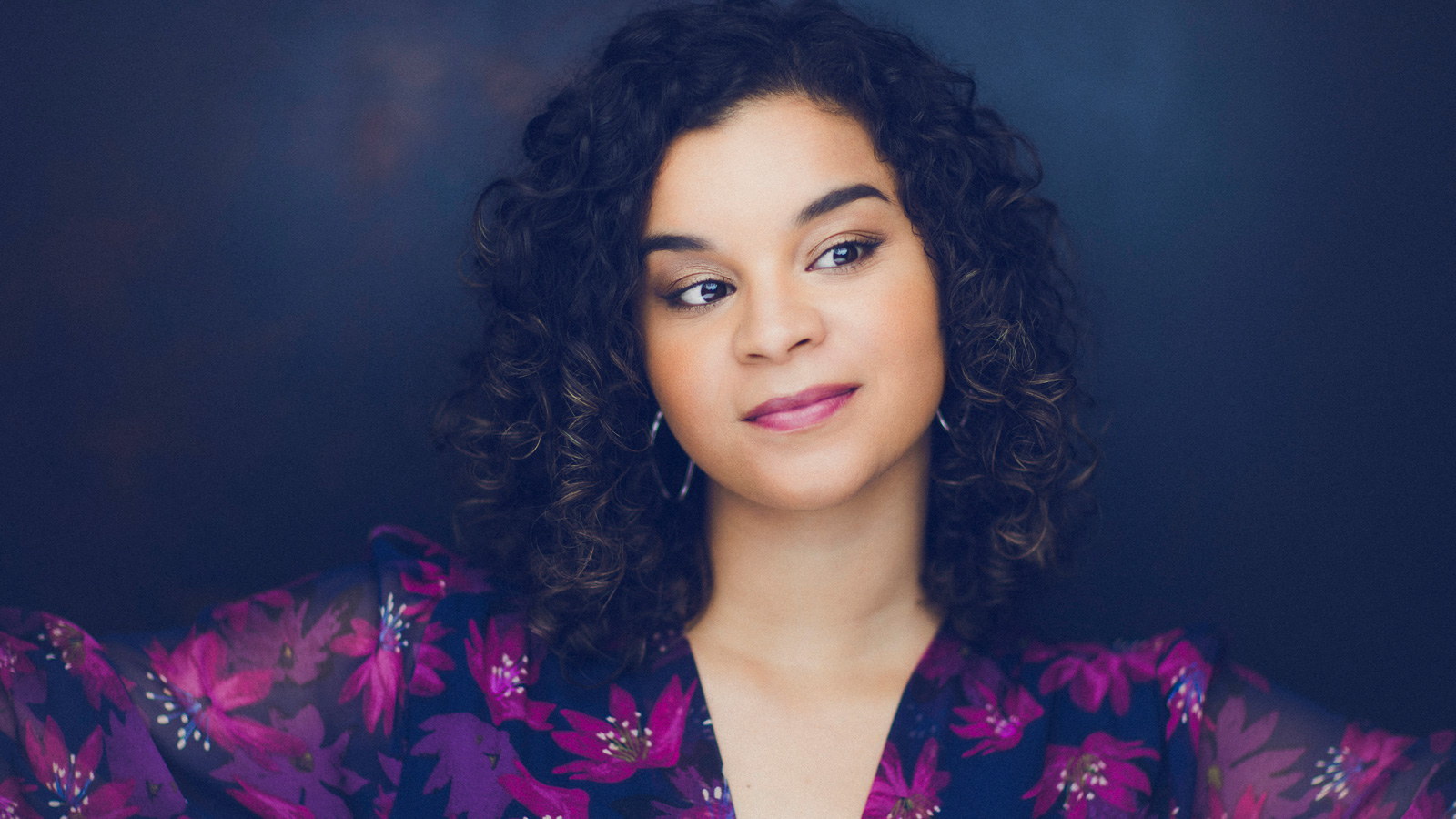Les Indes Galantes
Gulbenkian Orchestra and Choir
Event Slider
Date
- / Cancelled / Sold out
Location
Grand Auditorium Calouste Gulbenkian FoundationPricing
50% – Under 30 years old
15% – Over 65 years old
- Conductor
- Soprano
- Soprano
- Tenor
- Bass-Baritone
-
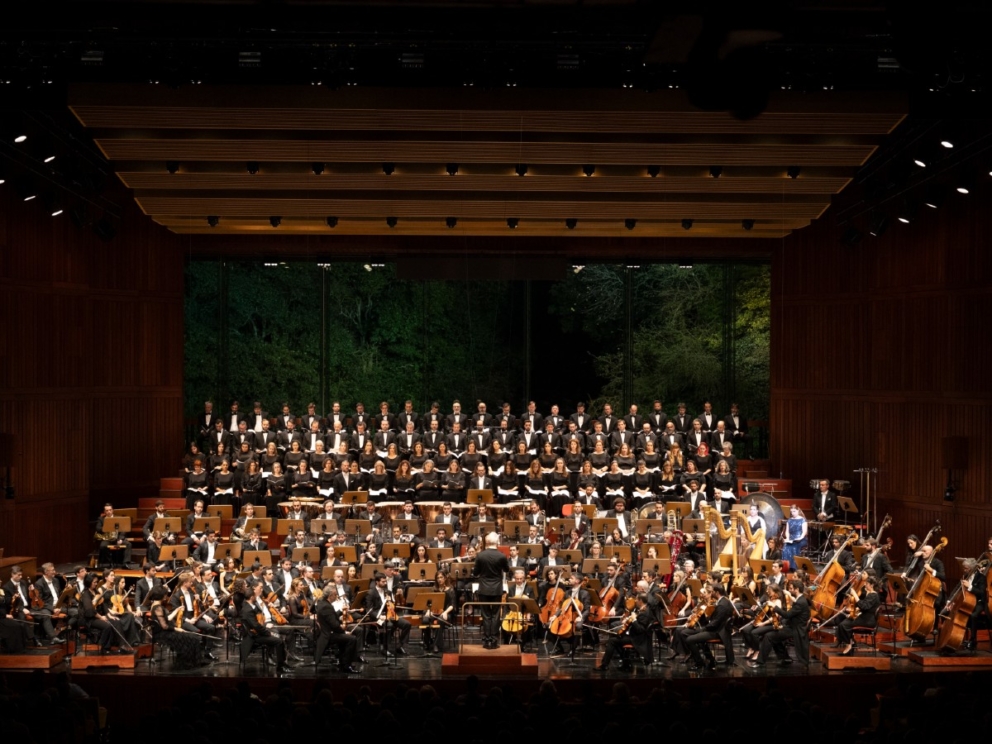
Gulbenkian Choir
Coro Gulbenkian was founded in 1964 by the Calouste Gulbenkian Foundation as a full symphonic body of around 100 singers. The choir joins the Orquestra Gulbenkian and other orchestras to perform Classical, Romantic and Contemporary choral-symphonic repertoire, but can also perform a cappella. It has performed – and often premiered – many 20th century works by Portuguese and international composers.
Coro Gulbenkian has been invited to collaborate with major international orchestras, under the direction of conductors such as Claudio Abbado, Colin Davis, John Nelson, Emmanuel Krivine, Esa-Pekka Salonen, Frans Brüggen, Franz Welser-Möst, Gerd Albrecht, Michael Gielen, Michael Tilson Thomas, Rafael Frübeck de Burgos, René Jacobs and Leonard Slatkin, among others.
Besides its regular season of concerts in Lisbon and frequent national tours, Coro Gulbenkian has repeatedly toured Argentina, Belgium, Brazil, Canada, Denmark, France, Germany, Hungary, India, Iraq, Israel, Italy, Japan, Macao, Malta, Monaco, Netherlands, Spain, the United Kingdom, the United States of America and Uruguay.
Coro Gulbenkian has recorded extensively for Philips, Deutsche Grammophon, Erato, Cascavelle, Musifrance, as well as FNAC-Music, performing a wide range of repertoire, from Early-Renaissance polyphony to Xenakis. Several of these albums received international awards.
Michel Corboz was the Principal Conductor between 1969 and 2019. Jorge Matta and Inês Tavares Lopes are currently the Associate and Assistant conductors, respectively.
-
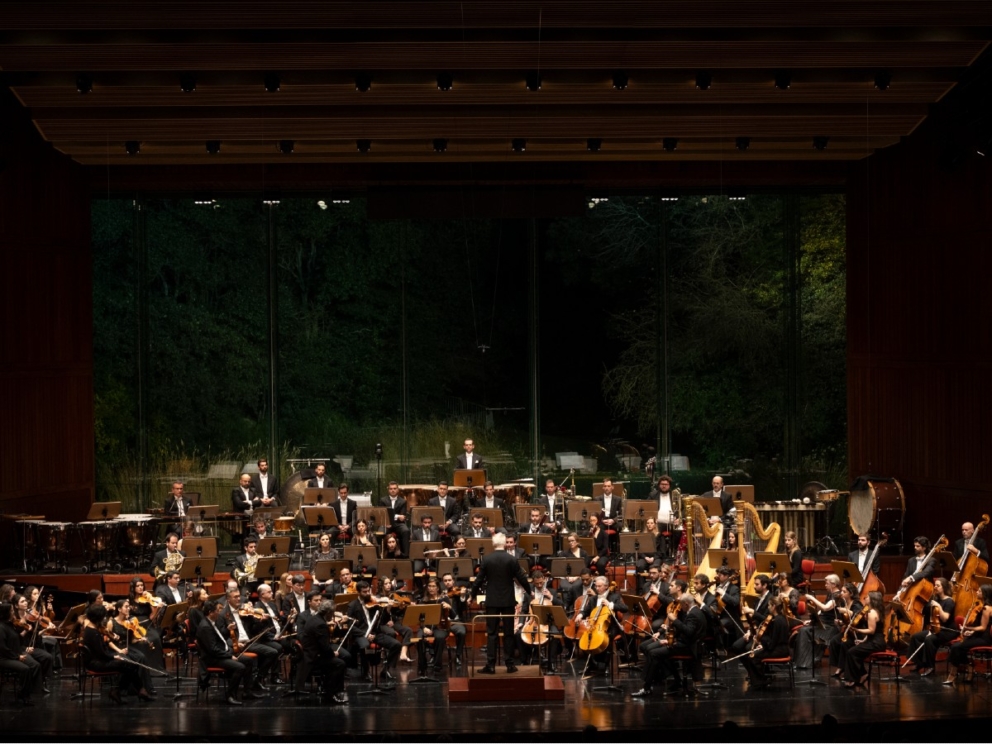
Gulbenkian Orchestra
In 1962, the Calouste Gulbenkian Foundation decided to establish a permanent orchestral ensemble. Originally with only twelve musicians (strings and continuo) it was named “Orquestra de Câmara Gulbenkian”. This collective was successively enlarged and today the “Orquestra Gulbenkian” (the name it has adopted since 1971) has a permanent body of sixty instrumentalists, a number that can be expanded depending on the repertoire.
This structure allows the Gulbenkian Orchestra to interpret works from the Baroque and Classical periods, a significant part of 19th century orchestral literature and much of the music of the 20th century, including works belonging to the current repertoire of the traditional symphonic orchestras. In each season, the orchestra performs on a regular series of concerts at the Gulbenkian Grand Auditorium in Lisbon, where it has had the opportunity of working together with some of leading names of the world of music (conductors and soloists). It has also performed on numerous locations all over Portugal, in an effort to decentralize music and culture.
The orchestra has been constantly expanding its activities in the international level, performing in Europe, Asia Africa, and the Americas. In the recording field, Orquestra Gulbenkian is associated to labels as Philips, Deutsche Grammophon, Hyperion, Teldec, Erato, Adès, Nimbus, Lyrinx, Naïve and Pentatone, among others, and this activity was recognized with several international prizes.
-
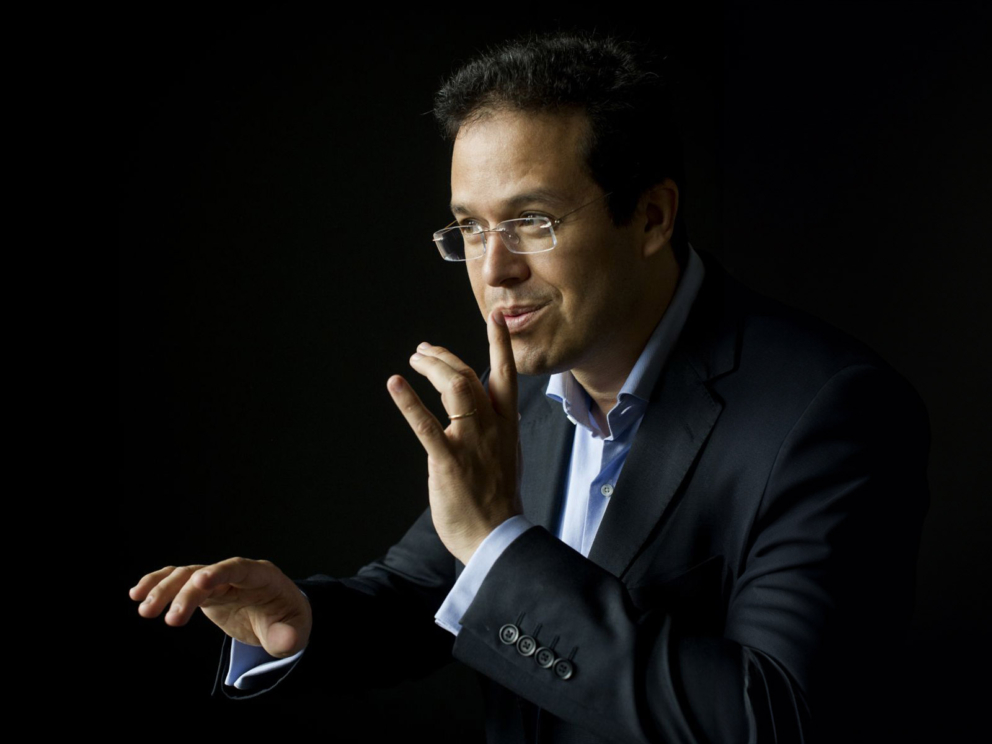
Leonardo García Alarcón
Conductor
After studying piano in Argentina, Leonardo García Alarcón moved to Europe in 1997 and joined the Geneva Conservatory in the class of harpsichordist Christiane Jaccottet. Leonardo García Alarcón emerged in a few years as the leading conductor of the baroque world. Argentinian by origin and holder of both Swiss and Argentinian nationality, he is coveted by the greatest musical and lyrical institutions, from the Paris Opera to the Teatro de la Zarzuela in Madrid and the Grand Theatre in Geneva, the city where he made his first appearance. It was under the guidance of Gabriel Garrido that he embarked on the baroque adventure, while also receiving the support of John Eliot Gardiner and Philippe Herreweghe.
Under the patronage of these established masters, he created about ten years ago his ensemble Cappella Mediterranea, following by the foundation of the Millennium Orchestra, which he also founded to accompany the Namur Chamber Choir, of which he took over the conductorship in 2010, one of the best baroque choirs in existence. He is divided between Geneva, France (notably as an assiduous pillar of the Ambronay Festival and, since this year, artist in residence at the Opéra de Dijon), Belgium, but also with sporadic visits to his native South America. A form of geographical eclecticism, to which his repertoire corresponds. With a taste and a vocation to bring back to life unknown works from Cavalli, Sacrati, Draghi, Falvetti. This is how we owe the reinstatement of Cavalli's operas: Eliogabalo, to open the Paris Opera season in 2016, Il Giasone in Geneva and Erismena at the 2017 Festival d’Aix-en-Provence, El Prometeo by Antonio Draghi in 2018 at the Opéra de Dijon or the recent rediscovery (also at the Opéra de Dijon) of Francesco Sacrati's La finta pazza, the very first opera imported to Paris. As a conductor or harpsichordist, he is invited by festivals, concert halls and orchestras all over the world.
In November 2018, he conducted Monteverdi's Orfeo in the staging of Sasha Waltz at the Berlin Staatsoper Berlin. In September 2019, triumphed with Rameau’s Les Indes Galantes at the Opéra Bastille on the occasion of the 350th anniversary of the Royal Academy of Music.
His discography has been unanimously acclaimed by critics. In September 2016, I 7 Peccati Capitali was released by Alpha Classic: an imaginary programme based on Monteverdi's tunes, hailed by the press and nominated in the "best recording" category at the “Victoires de la Musique” 2017. In 2018, he recorded sacred works by Jean-Baptiste Lully, an album around Joan Manuel Serrat and a set of works by Jacques Arcadelt, which received great critical acclaim. The opera production of Il Giasone from Geneva was released on DVD by Alpha Classics in February 2019.
In June 2019, Leonardo García Alarcón was made Chevalier de l’Ordre des Arts et des Lettres by the French government.
-
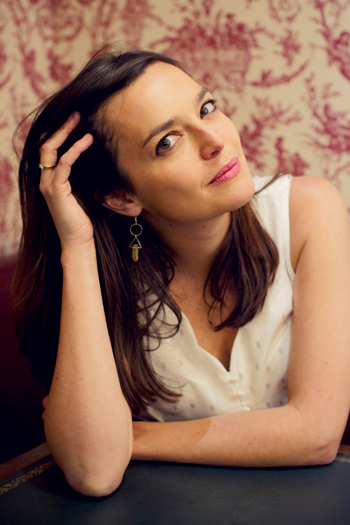
Sophie Junker
Soprano
Sophie Junker regularly performs with top-flight conductors including Harry Bicket (Dorinda Orlando), Laurence Cummings (Sigismondo in Handel’s Arminio, Aspasia in Alexander Balus and Michal in Saul), Christian Curnyn (Italian Woman in Charpentier’s Médée, Phoebe in Rameau’s Castor et Pollux), Masaaki Suzuki (Monteverdi’s Vespers), and Stefano Montanari (Zerlina Don Giovanni).
Described by Opera magazine as “… irresistibly charming”, Sophie already has an established relationship with the Opera Royal de Liège Wallonie (Elisetta Il Matrimonio segreto, Wanda La Grande Duchesse de Gérolstein, title-role in Pauline Viardot’s Cendrillon), and Angers-Nantes Opéra (Amour Orphée et Eurydice, Constance Dialogues des Carmélites). She made her American operatic début in 2016, singing Cleis in Martini’s Sapho and Hélène in Chabrier’s Une Éducation Manquée (Opera Lafayette, New York, and Washington). Further operatic roles include Caio in Vivaldi’s Ottone in Villa at the Copenhagen Opera Festival, Proserpine/Euridice in Charpentier’s La Déscente d’Orphée aux enfers (Wigmore Hall, The Hague), and Belinda (Dido and Aeneas, Innsbrucker Festwochen der Alten Musik).
On the concert platform, Sophie is a frequent soloist with Concerto Copenhagen and Lars Ulrik Mortensen, La Nuova Musica under David Bates, Belgium-based ensemble Vox Luminis, Le Concert de la Loge under Julien Chauvin, Le Poème Harmonique under Vincent Dumestre and Arcangelo under Jonathan Cohen. She performed Bach’s Johannes-Passion with Collegium 1704 (Paris, Prague, Dresden and Dortmund), Haydn’s Creation with the Russian National Orchestra in Moscow, Lully’s Grands Motets with the Namur Chamber Choir conducted by Leonardo García Alarcón, and Fauré’s Requiem under Klaas Stok (Amsterdam Concertgebouw).
Recently, Sophie Junker performed the roles of Cunegunda in Leonardo Vinci’s Gismondo (Vienna, Moscow, Dortmund, and Bayreuth), Venere in Legrenzi’s La divisione del mondo under Christophe Rousset (Strasbourg, Mulhouse, Colmar, Nancy, Versailles, and Cologne), and Eurilla in Handel’s Il Pastor Fido (Gliwice and Händel-Festspiele Halle). She made her house debut at Staatsoper Berlin singing Drusilla in L’Incoronazione di Poppea under Diego Fasolis. In Germany, she also sang the title role in Die Getreue Alceste by Schürmann conducted by Christina Pluhar (Rokokotheater Schwetzingen).
Sophie’s lithe and sparkling soprano has also been heard as Angelica in Vivaldi’s Orlando Furioso (La Seine Musicale), Clori in Cavalli’s Egisto (Royal Opera of Versailles) and Asteria in Handel's Tamerlano with the Moscow Chamber Orchestra conducted by Christopher Moulds (Tchaikovsky Hall, Moscow). In 2022 she made her debut as Cleopatra in Giulio Cesare under the direction of George Petrou (Reisopera and the Handel Festival in Göttingen).
The soprano’s discography includes Sacrifices with La Nuova Musica (Harmonia Mundi), Handel’s Esther with Laurence Cummings (Accent), Grétry’s L'Épreuve Villageoise (Naxos), Bach’s Secular Cantatas with the Bach Collegium Japan under Masaaki Suzuki (BIS), Stravaganza d’amore with Pygmalion under Raphaël Pichon (Harmonia Mundi) and Cunegunda in Leonardo Vinci’s Gismondo (Parnassus Arts Productions). In 2020, Sophie’s first solo album, La Francesina, was released under the label Aparté. This publication won an International Classical Music Award as well as the Trophée Forum-Opéra.
-
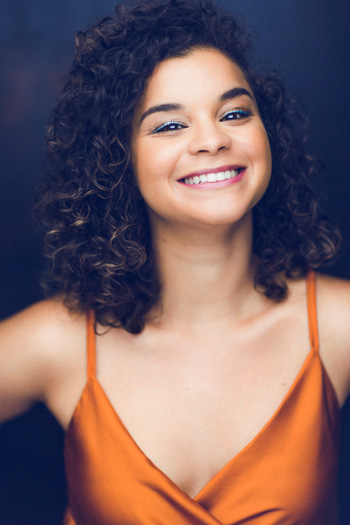
Julie Roset
Soprano
As the Grand Winner of the 2022 Metropolitan Opera Laffont Competition, the name of French soprano Julie Roset has rapidly become one to note and her performances as Zémire (Zémire et Azor) last season at Opéra Comique garnered unanimous acclaim, Le Figaro writing “the young soprano catches the light with her singing as natural as it is intelligent”.
Performance highlights of Roset’s 2023/24 season include her debut at Opéra de Paris as Amour in a new staging by David McVicar of Charpentier’s Médée under William Christie, a European concert tour of Mendelssohn’s Elijah with Ensemble Pygmalion and Raphaël Pichon, a curated programme of baroque arias entitled Elemental with ensemble Twelfth Night at Carnegie Hall, and a staged version of Die Schöpfung at Opéra de Lorraine with Music Director Marta Gardolińska.
Already making her mark on the operatic landscape, Julie Roset recently appeared at Festival d’Aix-en-Provence as both Valletto and Amore in Ted Huffmann’s inspired staging of L’incoronazione di Poppea under the baton of Leonardo García Alarcón, joined Sasha Waltz & Guests acclaimed production of L’Orfeo at Teatro Real Madrid as Euridice and La Musica, and sang Amore in L’incoronazione di Poppea at Opéra du Rhin under Raphaël Pichon. Roset made her Paris debut as Amour in Mondonville’s Titon et l’Aurore with Les Arts Florissants and William Christie at Opéra Comique, sang Papagena in Die Zauberflöte at Opéra de Toulon, joined Les Arts Florissants and Paul Agnew as Amour in Gluck’s Orfeo ed Euridice at the Philharmonie de Paris and, at Festival d’Aix-en-Provence, sang Clorinde in Il Combattimento, la théorie du cygne noir, a musical journey through the Italian baroque conducted by Sebastien Daucé.
As a concert performer, Julie Roset is in high demand with recent debuts including concert performances of Il re pastore at the Salzburg Festival with Mozarteum Orchestra conducted by Adam Fischer, Christmas Oratorio with Stavanger Symphony Orchestra under Ottavio Dantone, Haydn’s La Création with Julie Chauvin and Le Concert de la Loge at Festival de Saint-Denis and Acis and Galatea with l’Orchestre Philharmonique de Radio France under Alarcón. Julie Roset has formed strong connections with several ensembles including Leonardo Garcia Alarcón’s Cappella Mediterranea with whom her performances include Sacrati’s La Finta Pazza at Concertgebouw Amsterdam and, during her residency at the Aix Académie, she joined Ensemble Pygmalion and Raphaël Pichon for a programme of Mozart and contemporaries and she appeared as the Philistine Woman in Handel’s Samson with CAV&MA’s Millenium Orchestra at the Beaune and Namur Festivals.
On disc Julie Roset can be heard in her solo recording of works by Handel entitled Salve Regina, with Millenium Orchestra and released on the Ricercar label. Other recent recordings include Sigismondo d’India’s Lamenti e Sospiri with Capella Mediterranea on Ricercar, Brabant with Holland Baroque released on Pentatone and Dido and Aeneas with Les Argonauts released on the Aparté label.
Julie Roset began her vocal studies at an early age joining the Conservatoire du Grand Avignon going on to graduate with honors from the Haute Ecole de Musique de Genève in 2019 and she was awarded her artist diploma in Opera Studies from the Juilliard School in 2022.
-
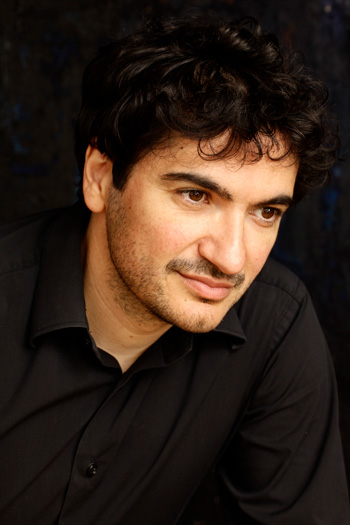
Mathias Vidal
Tenor
Mathias Vidal studied Musicology at the University of Nice and studied singing with teacher Christiane Patard. He graduated from the Paris Conservatory in 2003.
Praised for his qualities in the French repertoire, he took part in many operas by Rameau, Lully, Campra, Boismortier and also Monteverdi, Purcell, Cavalli… In the French light-music repertoire, he sang in such productions as Orphée aux Enfers, La Vie Parisienne, La Périchole, Fra Diavolo, La Belle Hélène, La Veuve Joyeuse, Le Dilettante d'Avignon, Barbe-Bleue, Les Chevaliers de la Table Ronde, La Fille de Madame Angot, L'Auberge du Cheval Blanc... His repertoire also includes Italian bel-canto roles such as Nemorino from L'elisir d'amore, Ernesto from Don Pasquale, Elvino from La sonnambula, Almaviva from Il Barbiere di Siviglia, Ramiro from La Cenerentola and the title-role of Le Comte Ory. He also sings the French romantic repertoire together with the 20th century and contemporary pieces.
In the past few seasons, he was heard in the role of Abaris from Les Boréades (Oldenburg, Dijon), Valère and Tacmas from Les Indes Galantes, Thespis from Platée and Der vierte Jude from Salomé (Paris Opera), Tamino from Die Zauberflöte (Avignon, Versailles), Ferrando from Cosí fan tutte (Toulouse), Ernesto from Don Pasquale (Oldenburg), Aristée/Pluton from Orphée aux Enfers (Komische Oper Berlin) as well as many title-roles : Platée, Orlando Paladino, Orphée et Eurydice, Le Comte Ory, Cinq-Mars, Faust, Der Zwerg...
He is very much in demand on the lyric stages in France as in the rest of Europe, Asia, the US and in Russia. He regularly takes part in live and studio recordings in a broad and versatile repertoire.
His projects for season 2023-2024 include Nadir from Les Pêcheurs de perles at the Capitole in Toulouse, the title-role in Platée at the Zürich Opera, Don Quichotte chez la Duchesse in Versailles, Abaris from Les Boréades in Oldenburg, the title-role in Atys by Lully (Avignon, Tourcoing, Théâtre des Champs-Elysées), Belmonte from Die Entführung aus dem Serail (French version) in Versailles as well as many concerts (Lélio by Berlioz with the Toulouse Capitole National Orchestra, Les Indes Galantes by Rameau with La Cappella Mediterranea at the Gulbenkian in Lisbon and several series with the Stradivaria ensemble, Le Palais Royal, La Chapelle Harmonique...).
-
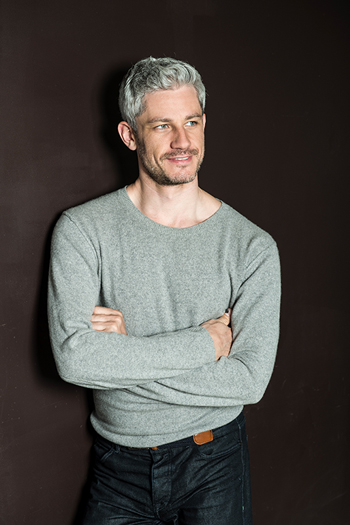
Edwin Crossley-Mercer
Bass-Baritone
From the outset of his career, bass-baritone Edwin Crossley-Mercer proved himself an outstanding talent amongst the rising generation of French singers and he continues to make his mark, performing on the most prestigious international stages. After studying in Versailles and Berlin, he made his opera debut as Mozart’s Don Giovanni in Berlin in 2006, reprising the eponymous role in 2013 in Dijon.
This season, Edwin Crossley-Mercer sings Armide at the Opéra Comique (Hidraot), Moïse et Pharaon at the Opéra national de Lyon, Tannhäuser (Biterholf) at the Osterfestspiele Salzburg and Le Prophète (Oberthal) at the Festival d’Aix-en-Provence. He also gives recitals and concerts, with orchestras such as the Orchestre Philharmonique de Radio France and the Orchestre National du Capitole Toulouse.
Recent highlights include Don Alfonso (Cosi fan Tutte) at the Opernhaus Zurich, Guglielmo (Cosi fan tutte) at the Opéra de Paris, the Bayerische Staatsoper and the Opera Vlaanderen, Dandini (La Cenerentola), Don Fernando (Fidelio), Rodomonte (Orlando Paladino), Reimann (Lear) at the Bayerische Staatsoper, Ned Keene (Peter Grimes) and Walter Furst (Guillaume Tell) at the Theater an der Wien.
Edwin Crossley-Mercer is also a fine singer in the French baroque repertoire and is regularly invited to take part in productions of Les Indes Galandes, Les Boréades, Platée, Castor et Pollux, Hippolyte et Aricie.
In concert, Edwin Crossley-Mercer sang under the baton of prestigious conductors and alongside prestigious orchestras such as the Berliner Philharmoniker, the Wiener Symphoniker, the Orchestre National de Radio France, the Los Angeles Philharmonic, the London Symphony Orchestra, etc. Recently, he sang L’Enfance du Christ and La Damnation de Faust with the Orchestre National de France under Emmanuel Krivine, the Saint Matthew Passion at the Gulbenkian Foundation in Lisbon, Beethoven’s Sympohny N°9 with the Ulster Orchestra.
His particular affection for oratorios and recitals has always been an essential component of his musical life. He has performed at the Carnegie Hall, the Musée d’Orsay in Paris (Die Winterreise, Die Schöne Magelone), at the “Folles Journées” in Nantes and Tokyo, in Montevideo, and in St Petersburg. He sings Lieder and melodies in collaboration with many pianist accompanists.
Recipient of the 2007 HSBC Foundation Award and the winner of the Lili and Nadia Boulanger Voice Prize, twice nominated for the Grammy Awards, he has recorded many pieces of baroque music as well as several Nadia Boulanger melodies for Delos. He has collaborated with the American composer Michael Linton, with whom he recorded two albums, (Carmina Catulli ainsi que Songs of Oscar Wilde).
In 2021, Franz Schubert‘s Die Winterreise notably became Edwin Crossley-Mercer’s first Lieder recording.
In parallel to his singing career, Edwin is also regularly engaged to work as a composer and conductor.
Jean-Philippe Rameau
Les Indes galantes (concert version)
After witnessing a display of Louisiana Indian dances performed in Paris by the Metchigaema chiefs in 1723, French composer Jean-Philippe Rameau was inspired by what he witnessed to create an opéra-ballet entitled Les Indes galantes. A masterpiece of the Enlightenment, Les Indes galantes starts from the desire to encounter distant cultures (Turkish, Inca, Persian or Native American), from a fascinated European gaze. Rediscovered in the 20th century, the work was previously conducted by the maestro Leonardo García Alarcón, who now presents it in concert version.
Credits
Sponsor Gulbenkian Music
The Calouste Gulbenkian Foundation reserves the right to collect and keep records of images, sounds and voice for the diffusion and preservation of the memory of its cultural and artistic activity. For further information, please contact us through the Information Request form.

